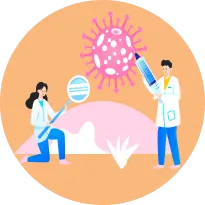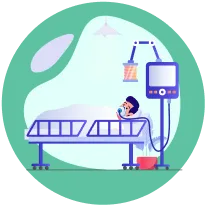- Email: [email protected]
- Contact: +1 (407)581-9000
COVID-19 & Cancer
CancerGuru
COVID-19 & Cancer

Covid-19 & Cancer
The intersection of COVID-19 and cancer presented unique challenges, amplifying risks and reshaping care for our community of patients and caregivers. Major cancer organizations had recognized that individuals with cancer face heightened vulnerability to severe COVID-19 outcomes due to compromised immune systems, a concern echoed across health authorities. For our users, understanding this dynamic is still essential to navigating health decisions in a post-pandemic landscape.

Risks of Covid-19 on Cancer
Cancer patients, particularly those undergoing treatments like chemotherapy or radiation, often have weakened immunity, increasing susceptibility to infections. The CDC reported that cancer patients are up to 60% more likely to experience severe COVID-19 complications, such as hospitalization or death, compared to the general population. In 2022, the ACS noted that cancer patients accounted for 5% of COVID-19 deaths despite comprising 1% of the US population, underscoring this risk.

Preventive Measures
Prevention is critical. Vaccination remains a cornerstone, with updated COVID-19 vaccines, shown to reduce severe outcomes by 70% in immunocompromised groups. Additional precautions—mask-wearing in crowded settings, hand hygiene, and avoiding high-risk environments have certainly protected patients. We offer practical tips like scheduling treatments during off-peak hospital hours to minimize exposure.

Hybrid Care models
The pandemic also disrupted cancer care. A 2021 ACS survey found that 27% of patients delayed screenings or treatments due to COVID-19 concerns, potentially worsening outcomes. Telehealth emerged as a lifeline, with over 40% of oncology visits shifting online, enabling continuity. As of 2025, hybrid care models persist, balancing safety and access. We help our audience with informed guidance, ensuring tailored strategies—vaccination, precautions, and flexible care to mitigate COVID-19’s impact on cancer management which is felt even now.
Frequently Asked Questions About COVID-19 and Cancer
Early diagnosis and treatment of cancer substantially enhance patient outcomes. According to the ACS, detecting cancer at an initial stage—before it metastasizes—often results in higher survival rates and less invasive interventions. For example, localized breast cancer boasts a 5-year survival rate of 99%, compared to 31% for metastatic cases (ACS Cancer Statistics, 2023). Prompt action limits tumor growth and spread, improving the efficacy of therapies such as surgery or targeted treatments. Delays may exacerbate disease progression, underscoring the urgency of timely medical evaluation.
The acceptable duration before seeking medical consultation varies by circumstance. The NCI advises that persistent symptoms—such as a palpable mass or unexplained fatigue—warrant evaluation within two weeks, as certain cancers may progress rapidly, doubling in size within a month. For routine screenings, such as mammograms, the ACS suggests delays of a few months may be tolerable absent symptoms. Given ongoing COVID-19 considerations in 2025, patients are encouraged to contact their healthcare provider promptly to assess urgency and ensure appropriate timing of care.
An individual is deemed immune compromised when their immune system functions suboptimally, impairing its ability to combat infections. Per the CDC, cancer patients undergoing treatments like chemotherapy or radiation often experience reduced white blood cell counts, critical for immunity. Hematologic malignancies, such as leukemia, may further diminish immune capacity. This state, also termed immunosuppression, heightens susceptibility to pathogens like SARS-CoV-2, potentially prolonging illness or increasing severity. It does not imply complete vulnerability, but rather a compromised defensive response.
Yes, a cancer history elevates the risk of severe COVID-19 complications. The CDC identifies cancer survivors, particularly those with recent or active disease, as more prone to hospitalization or critical illness. A 2022 NCI analysis indicated a 60% increased likelihood of severe outcomes among cancer survivors compared to the general population, attributed to residual immune deficits or organ damage from prior treatments. For long-term survivors in good health, this risk diminishes, though vigilance—such as adhering to preventive measures—remains advisable, with consultation from a physician recommended.
Chemotherapy and radiation do not inherently increase the likelihood of contracting COVID-19, but they heighten the risk of severe illness if infected. The ACS explains that these treatments suppress immune function, notably reducing white blood cell counts essential for fighting viruses. CDC data from 2023 suggest patients on active therapy face a 40% greater risk of severe COVID-19 outcomes, such as respiratory failure. Preventive strategies—vaccination, masking, and distancing—are critical during treatment to mitigate these risks, though susceptibility to infection itself aligns with general exposure levels.
COVID-19 poses distinct challenges for cancer patients due to their heightened vulnerability. The CDC indicates that individuals with active cancer or recent treatment history face an elevated risk of severe illness, including hospitalization or respiratory complications. A 2023 NCI study found cancer patients were 50% more likely to require intensive care if infected, owing to immune suppression from therapies or the disease itself. Unlike the general population, whose risk varies primarily by age or comorbidities, cancer patients’ compromised immunity amplifies susceptibility, necessitating stringent preventive measures such as vaccination and isolation during outbreaks.
Yes, cancer patients qualify for additional COVID-19 vaccine doses to bolster protection. The CDC recommends that immunocompromised individuals, including those undergoing chemotherapy or with active malignancies, receive booster doses following the primary series—typically an extra shot 3-6 months post-initial vaccination, with annual updates advised as of 2025. The ACS emphasizes timing these doses around treatment cycles, ideally during periods of immune recovery (e.g., pre-chemotherapy), as coordinated with an oncologist. This approach enhances antibody response, critical for those with diminished immunity.
During periods of heightened COVID-19 transmission, cancer patients must adopt rigorous precautions for in-person medical visits. The ACS advises wearing a well-fitted N95 or KN95 mask, maintaining physical distance in waiting areas, and sanitizing hands frequently. Patients should confirm with healthcare facilities that staff adhere to infection control protocols, such as masking and ventilation. Telehealth consultations may substitute for non-urgent visits, per NCI guidance, minimizing exposure risk while ensuring continuity of care. Coordination with providers to schedule appointments during low-traffic times further reduces potential contact.
A COVID-19 infection can indeed postpone scheduled cancer surgeries, contingent upon clinical factors. The ACS notes that active infection typically delays procedures by 2-6 weeks to allow recovery and reduce surgical risks, such as postoperative pneumonia. Decisions hinge on the cancer’s urgency—non-aggressive tumors may tolerate brief delays, whereas rapidly progressing cases may proceed with enhanced precautions (e.g., negative testing, isolation). Multidisciplinary teams, including oncologists and infectious disease specialists, assess patient status and local COVID-19 prevalence, balancing treatment needs against infection-related complications.
A previous COVID-19 infection may influence long-term cancer management, particularly if complications persist. The NCI highlights that survivors of severe COVID-19 may experience lung damage or fatigue, potentially complicating radiation or chemotherapy tolerance. A 2024 CDC report suggests 10-15% of cancer patients with prior infection report lingering symptoms (e.g., shortness of breath), necessitating adjustments in follow-up care, such as more frequent imaging or pulmonary support. Oncologists tailor management plans accordingly, integrating post-COVID recovery into ongoing treatment strategies to optimize outcomes.

